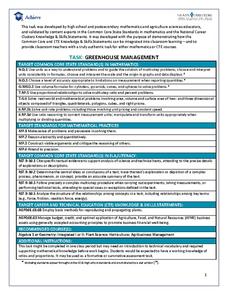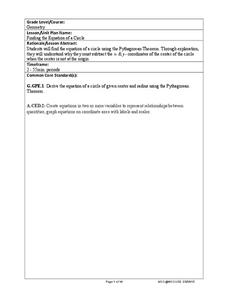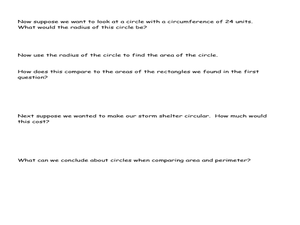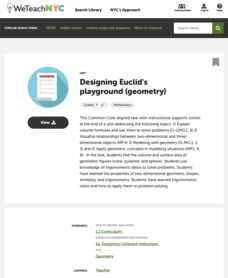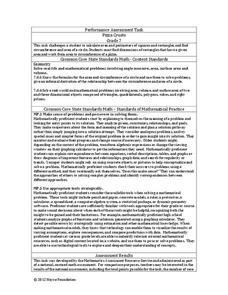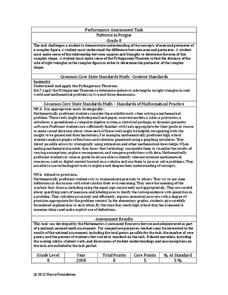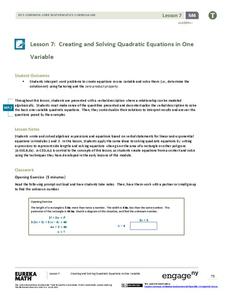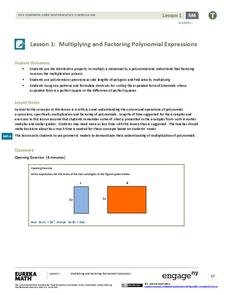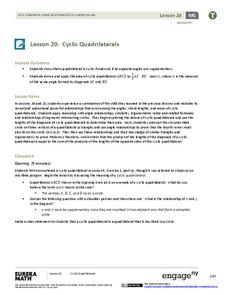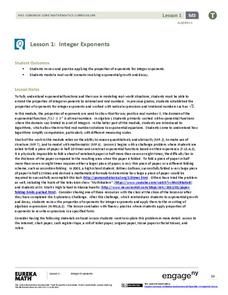EngageNY
Ptolemy's Theorem
Everyone's heard of Pythagoras, but who's Ptolemy? Learners test Ptolemy's Theorem using a specific cyclic quadrilateral and a ruler in the 22nd installment of a 23-part module. They then work through a proof of the theorem.
Achieve
Greenhouse Management
Who knew running a greenhouse required so much math? Amaze future mathematicians and farmers with the amount of unit conversions, ratio and proportional reasoning, and geometric applications involved by having them complete the...
Illustrative Mathematics
Equal Area Triangles on the Same Base II
A deceptively simple question setup leads to a number of attack methods and a surprisingly sophisticated solution set in this open-ended problem. Young geometers of different strengths can go about defining the solutions graphically,...
Insurance Zebra
Insurance Curriculum for Middle and High School Teachers
Liability, deductible, premium ... what do these words mean, and how do they relate to insurance? Scholars complete a pre-test, matching vocabulary activity, and insurance timeline worksheet and become familiar with these terms. Next,...
West Contra Costa Unified School District
Finding the Equation of a Circle
Tired of going around and around for a resource on circles? Scholars determine the general equation of a circle on a coordinate plane, then participate in an activity matching equations to the radii and centers of the circles...
College Board
Is That an Assumption or a Condition?
Don't assume your pupils understand assumptions. A teacher resource provides valuable information on inferences, assumptions, and conditions, and how scholars tend to overlook these aspects. It focuses on regression analysis, statistical...
Curated OER
Comparing Area and Perimeter
Students solve problems by finding the perimeter and area of an enclosed area. In this geometry lesson, students differentiate between the area and the perimeter. They see how they relate and how to use it to maximize an enclosed area.
New York City Department of Education
Designing Euclid’s Playground
Create a geometric playground. Pupils work through a performance task to demonstrate their ability to use geometric concepts to solve everyday problems. The accompanying engineering design lessons show teachers how the assessment works...
Noyce Foundation
Pizza Crusts
Enough stuffed crust to go around. Pupils calculate the area and perimeter of a variety of pizza shapes, including rectangular and circular. Individuals design rectangular pizzas with a given area to maximize the amount of crust and do...
Inside Mathematics
Patterns in Prague
Designers in Prague are not diagonally challenged. The mini-assessment provides a complex pattern made from blocks. Individuals use the pattern to find the area and perimeter of the design. To find the perimeter, they use the Pythagorean...
EngageNY
Creating and Solving Quadratic Equations in One Variable
Give your classes practice at modeling using quadratic models with a resource that uses area and integer problems to allow individuals to create second degree polynomials. Young mathematicians solve equations using factoring and then...
Kentucky Department of Education
Multiplication Grade 3 Formative Assessment Lesson
Guide multiplication lesson plan instruction with a formative assessment. Mathematicians are given two multiplication problems to solve and represent using the area model, equal groups, repeated addition, and word problems. Following the...
Teach Engineering
Glue Sticks Bend and Twist
Stick this resource in the "Use" column. In the second installment of a six-part series, learners use glue sticks to demonstrate forces. Using glue sticks, instructors can demonstrate tension, compression, and torsion.
Teach Engineering
Energy Efficiency
Using the resource is probably the most efficient way to learn about efficiency. The 18th installment of a 25-part Energy Systems and Solutions unit has pupils investigate energy efficiency through discussions and associated activities....
Curated OER
Investigation Area of Geometric Shapes
Fourth graders use triangle paper to design patterns using geometric figures and find the areas of those figures by counting units. Students are assessed by determining which figure has the greatest area and explaining their reasoning.
Curated OER
Finding Circumference and Area of a Circle
Young geometers explore the concept of circumference and area of circles. They discuss what information is needed to find circumference and area. The resource employs several instructional methods: Frayer Model for Vocabulary, literature...
EngageNY
Multiplying and Factoring Polynomial Expressions (part 1)
Polynomial multiplication and factoring go hand in hand. Why not teach them together. This resource begins with an area model for distributing a monomial and then connects the process to factoring the GCF. Learners then advance to...
EngageNY
Cyclic Quadrilaterals
What does it mean for a quadrilateral to be cyclic? Mathematicians first learn what it means for a quadrilateral to be cyclic. They then investigate angle measures and area in such a quadrilateral.
Teach Engineering
How Big? Necessary Area and Volume for Shelter
Teams must determine the size of cavern needed to house the citizens of Alabraska to protect them from the asteroid impact. Using scaling properties, teams first determining the number of people that could sleep in a classroom and then...
EngageNY
Integer Exponents
Fold, fold, and fold some more. In the first installment of a 35-part module, young mathematicians fold a piece of paper in half until it can not be folded any more. They use the results of this activity to develop functions for the area...
Curated OER
Circumference and Area of Circles
In this circumference and area of circles worksheet, students find each to 1 decimal place of 12 given circles. A website reference for additional resources and answer key are given.
Curated OER
Fractals Teachers' Notes
When you see a flower or a tree in nature do you see the math? This web resource contains many ideas for using fractals in a math class including Sierpinski’s triangle, Koch's Snowflake, and the Jurassic Park Fractal. Additionally, it...
101 Questions
The Ticket Roll
This is your ticket to understanding estimation. Scholars estimate the number of tickets on a ticket roll. To perform the task, they use pictures and given dimensions of a ticket roll and of a single ticket and apply concepts of area and...
Big Learning
The Antarctica Project: A Middle School Mathematics Unit
Antarctica is a big place, large enough to provide ample opportunities to learn about math. A two-week unit teaches middle school mathematics concepts using project-based learning. The resource covers functions, geometry (area,...



